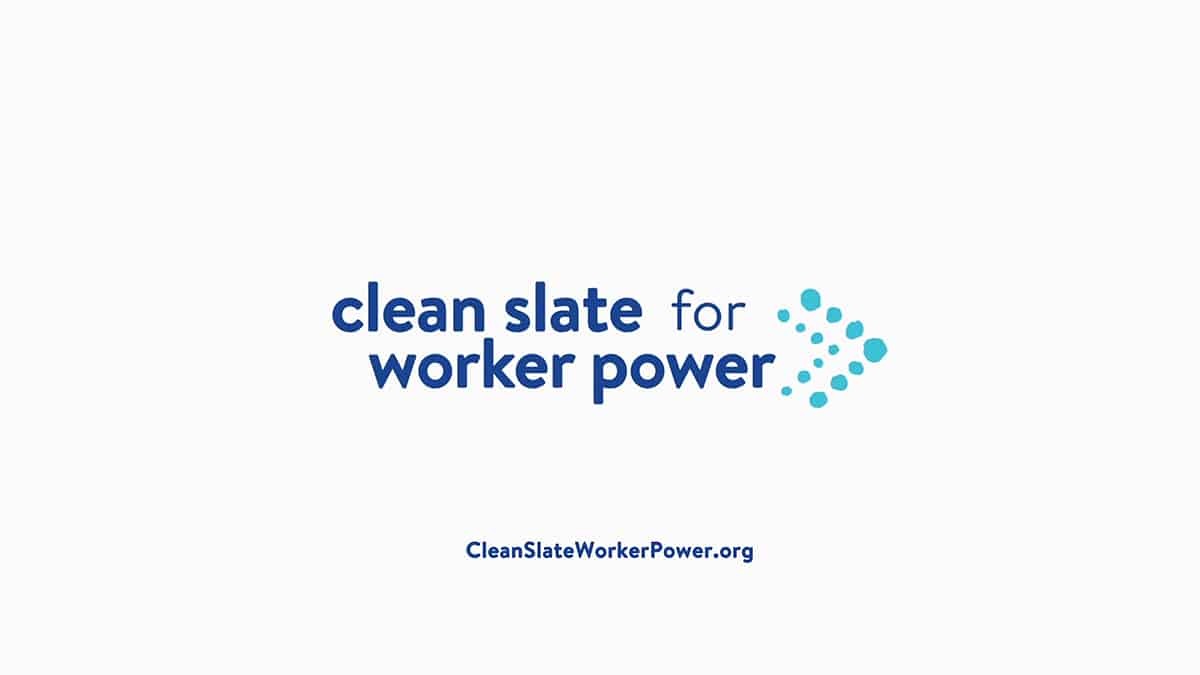
Leigh Thomas is a student at Harvard Law School.
Clean Slate for Worker Power released a report today outlining recommendations for empowering worker voices and building a more equitable economy in the face of the coronavirus pandemic. The report focuses on various threats COVID poses to working people: not just threats to health and safety, but also limits on worker organizing imposed by social distancing, the burden of sustained high unemployment, and novel threats to voting access. Recommendations for empowering workers to demand safe and healthy workplaces include requiring businesses to have a worker-elected “safety steward,” setting up commissions to negotiate sector-wide workplace-safety standards, and passing just-cause dismissal statutes to protect workers from retaliation by employers. To empower worker organizing, the report recommends facilitating virtual picket lines and prohibiting employer surveillance of digital communications by workers. New government-funded, pandemic-related jobs are a potential tool to address high unemployment; the report recommends ensuring such jobs be represented by unions and subject to high labor standards. Polling from Data for Progress demonstrates substantial bipartisan support among voters for these types of reforms. OnLabor’s Professor Ben Sachs told The Atlantic these reforms can be effective at the state and local level even if they do not gain traction in Congress. Today’s report is the second released by Clean Slate for Worker Power, a project of Harvard Law School’s Labor and Worklife Program.
As protests aimed at police brutality and racial inequality continue across the country, proposals have emerged for addressing racism and racial disparities in the workplace. In an Op-Ed for The New York Times, Nicole Taylor urges Black workers facing discharge to reject severance packages that require signing nondisclosure agreements. “[T]he only way black women like myself can begin to heal and reclaim our power at organizations where we have encountered gaslighting and emotional trauma is to refuse corporate muzzling,” Taylor writes. Black workers recently have been shedding light on racism baked into workplace culture at many prominent companies. Taylor encourages speaking out about racism and racist microaggressions as a debt paid to living and dead ancestors, who lacked financial resources or security to challenge race-based harassment and wage disparities. In Forbes, Shahar Ziv argues for companies to address racial and gender wage gaps by banning salary histories. Racial and gender wage gaps have widened during the last twenty years, according to data from the Economic Policy Institute. Salary histories allow employers to perpetuate these gaps as workers switch jobs. Nineteen states and several cities have enacted salary history bans since 2016. The policies have proved effective, with data showing Black and female job switchers increased their salaries by more than comparable job switchers.
Reporting by the Guardian reveals that police unions have spent millions at the local, state and federal level to push back against efforts to reform law enforcement policy. This includes at least $64.8m spent in Los Angeles, $19.2m in New York City and $3.5m in Chicago. The money spent goes towards payments to city council members and state legislators, as well as lobbying costs. In LA, both the chair of the city council’s ad hoc committee on police reform and the public safety committee chair each have received hundreds of thousands of dollars from the police unions. Police unions also put money behind blocking a statewide ballot proposal to ban the death penalty. Zachary and Mackenzie have both reported on the ongoing struggle within the labor movement to push large unions to disaffiliate with police unions
July 31st is the expiration date for the $600 per week enhanced unemployment benefit currently helping to keep millions of Americans afloat. The consequences of losing that benefit could be disastrous for families who have lost income due to coronavirus shutdowns. Economists and policymakers debate whether eliminating the benefit is necessary to incentivize returning to work as state economies reopen. The Congressional Budget Office reported that if the benefits are extended, employment would probably be lower in the second half of 2020 and in 2021 than it would be without the extension. Critics of the report point out that eliminating the benefit will cause a negative fiscal shock, reducing consumer spending and hurting families. Supporters of extending the benefit point out that even with states reopening, roughly 21 million people are still unemployed. The HEROES Act, passed by the House in May but currently stalled in the Senate, would extend the extra $600 benefit until January 31, 2021.
On Monday, the Supreme Court denied certiorari on a Massachusetts case dealing with wage & hour laws for au pairs. An organization that places au pairs with families brought the suit in 2016 arguing that the federal law relating to au pairs preempts Massachusetts wage, over time, and Domestic Worker Bill of Rights laws. In December, the Court of Appeals for the First Circuit affirmed a lower court’s decision that the plaintiffs had not met their burden of proof to show that Massachusetts law was preempted. The au pair program, administered by the U.S. Department of State, allows young people to travel to the United States under a special visa to study and provide live-in child care. The Massachusetts minimum wage is higher than the federal minimum wage, and the Domestic Worker Bill of Rights has requirements for rest periods and recordkeeping beyond federal mandates. Massachusetts Attorney General Maura Healey said her office was pleased with the outcome, which confirms that Massachusetts law protects au pairs.






Daily News & Commentary
Start your day with our roundup of the latest labor developments. See all
July 2
Block, Nanda, and Nayak argue that the NLRA is under attack, harming democracy; the EEOC files a motion to dismiss a lawsuit brought by former EEOC Commissioner Jocelyn Samuels; and SEIU Local 1000 strikes an agreement with the State of California to delay the state's return-to-office executive order for state workers.
July 1
In today’s news and commentary, the Department of Labor proposes to roll back minimum wage and overtime protections for home care workers, a federal judge dismissed a lawsuit by public defenders over a union’s Gaza statements, and Philadelphia’s largest municipal union is on strike for first time in nearly 40 years. On Monday, the U.S. […]
June 30
Antidiscrimination scholars question McDonnell Douglas, George Washington University Hospital bargained in bad faith, and NY regulators defend LPA dispensary law.
June 29
In today’s news and commentary, Trump v. CASA restricts nationwide injunctions, a preliminary injunction continues to stop DOL from shutting down Job Corps, and the minimum wage is set to rise in multiple cities and states. On Friday, the Supreme Court held in Trump v. CASA that universal injunctions “likely exceed the equitable authority that […]
June 27
Labor's role in Zohran Mamdani's victory; DHS funding amendment aims to expand guest worker programs; COSELL submission deadline rapidly approaching
June 26
A district judge issues a preliminary injunction blocking agencies from implementing Trump’s executive order eliminating collective bargaining for federal workers; workers organize for the reinstatement of two doctors who were put on administrative leave after union activity; and Lamont vetoes unemployment benefits for striking workers.